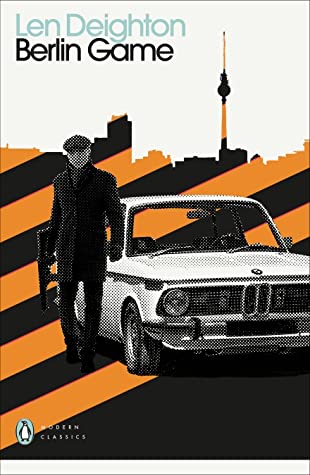Berlin Game by Len Deighton
My rating: 3 of 5 stars

I first arrived in Berlin in 1991, having hitchhiked through East Germany in a series of old Trabants and the odd Mercedes. It was the day the telephone company was ripping out all the old GDR public phones and replacing them with Wessie ones, and as I crossed from the lights and noise of West Berlin into East Berlin, I realised I was going to have a hard time making a phone call. In the following years, I would work (and even have one notable flirtation) with East Germans as they struggled to adjust to life in a West that had swallowed their country.
So when I picked up Len Deighton’s Berlin Game, I hoped to revisit a little bit of that intangible sense of Cold War Germany – the clash of cultures and the deeper German culture that lay underneath; the fear and hatred of the Stasi; the casual bigotry of the Wessies against the Ossies; the dull tastelessness of Communism braced against the glitzy degeneracy of Capitalism.
To his credit, Deighton tries hard to fill the book with enough details to create that mood. But that is just the problem: he tries too hard. The details are too studied to feel credible. It contrasts well with the movie Goodbye Lenin, a beautiful and compelling sketch of East Germanness that draws from the artists’ resevoir of details with the natural ease of true natives.
The other major problem is with the book’s protagonist – whose name I have (tellingly) already forgotten two weeks after reading. Who is this man? Is he the pensive, understated and soft-spoken antihero the dialogue suggests? Or is he the scary hard man, prone to outbursts of violence, whom the narrator goes to great pains to describe? After reading the book, I still cannot really say and I’m sure Deighton had no real idea.
This points to a wider weakness in Deighton’s writing. His highly stylistic descriptions are used as a sticking plaster to cover over the shallowness of his characters. I paraphrase a sample here: “She flashed him the kind of smile that said she wanted to know more about his past, but was slightly afraid to ask the question.” There are dozens of these kinds of ‘smiles’ peppered throughout the text, and I’m sure if Deighton sat down with a police sketch artist he would be unable to create a drawing of a single one of them.
Of course, the book is ultimately a spy novel, and therefore should be judged by its compelling, racy plot. But here I have to give it only middling marks. In fact, very little happens, and although the ending is somewhat surprising, it achieves this ‘twist effect’ only by sacrificing the gritty realism that kept the action credible but slow the rest of the way through.
Ultimately the most interesting thing about Berlin Game has nothing to do with spies and little to do with the Cold War. It is what the story tells us about the very English author and his own country. Deighton, son of a working class man, struggled to find a place in a Britain that had faded from power. He wrote the book at the dawn of Thatcherism, at a time when his country had been humiliated by an IMF economic programme, shocked by race relations and bruised by the paramilitary consequences of Britain’s occupation of Northern Ireland.
The result is a well-wrought tale of bureaucratic London, pervaded by wry cynicism and divisions of social class, all washed down by copious glasses of neat gin. The details are sparse, but authentic. In this, we see that Deighton is truly writing what he knew.
View all my reviews


